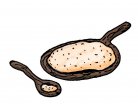GM organisms are species that did not exist in nature, but were created by man. This means that man tampered with nature’s job, affecting the natural balance and the evolution of species. Large multinational companies base their existence on the sale of GM seeds and fertilizers, some sell corn seeds containing mice genes, others sell tomatoes with goldfish genes. And you know what’s funny? Most of us have already eaten those things!
In recent years, a huge controversy has developed between Europe and the United States on the trade of GM foods; the EU has imposed, through legislation, the quoting of GM ingredients on labels, while the United States suggests that GM ingredients are not mentioned on labels, so that consumers do not negative associations. But are these associations justified?
Some proven or possible effects of GM engineering are the following:
On humans:
• Deaths. In 1989 dozens of American died and thousands were affected by the genetic modification of a food supplement, L-tryptophan. The Showa Denko company paid $2 billion in compensation.
• Strong allergic shocks. In 1996, the Pioneer Hi-Bred company, placed peanut genes in soya beans, resulting in testing volunteers having strong allergic reactions, and almost dying. Fortunately, they withdrew the product before it went on the market.
• Cancer. The Monsanto corporation engineered a hormone named rBGH, to be injected into cows, which was proven increase the chance of breast and prostate cancer in humans by 400-500%. The hormone was banned in Canada, Europe and Australia, but in the United States it is not only legal, but farmers are encouraged by the state to use it!
• Viral diseases. Mixing different genetic substances has been proven to create super-viruses, resistant to antibiotics, that can harm humans far more than regular viruses.
On the environment:
• Toxic soils. GM seeds are supposed to be more resistant to harmful micro-organisms and insects, but they are also more resistant to chemicals. Therefore, the use of chemical pesticides and fertilizers actually increases rapidly and intoxicates soils.
• Extinction of seed species. Monsanto and other companies prohibit, by contract, the use of farmers' own seeds, thus controlling and limiting the variety of cultivated seeds.
• Super-seeds. Genetic substances from GM cultivation can be transported through the earth to other wild plants, resulting in the creation of super-seeds, resistant to butterflies, worms and other species, thus affecting the natural food chain.
• Destruction of organic farming. Soils are infected so much by GM fertilizers, that, according to certain research, after 50-100 years it will be impossible to cultivate plants with organic methods.
• Extinction of beneficial insects. Strong pesticides and GM plants themselves, exterminate both harmful and beneficial insects, making other plants more corruptible.
• Mammal poisoning. Some GM plants are responsible for the poisoning of certain mammals, such as mice and weasels.
These are only the results that have been observed up to now; GM foods are a relatively new product, and as such, we have a long future ahead of us, before we realize the full extent of the harm they may cause. For the time being, our only defense is to be informed and avoid products of uncertain origin.


































































